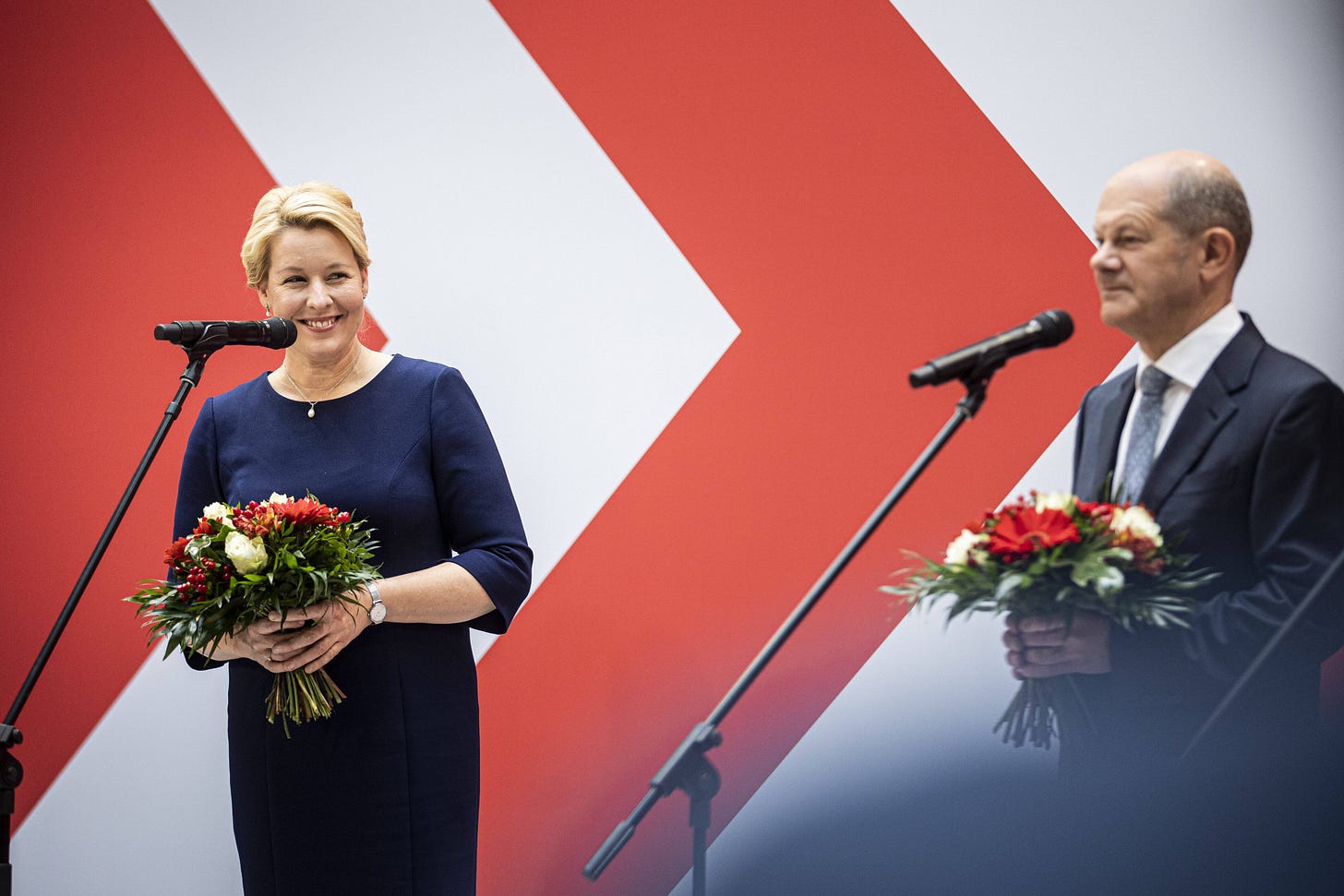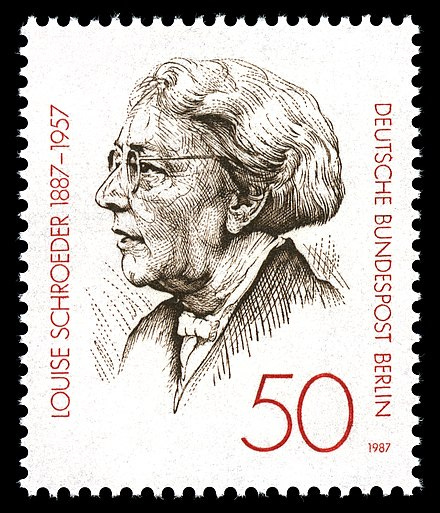#9: What the election results mean
The center-left SPD will lead a national government. Maybe. And Berlin's new government. Definitely.
Hi Berliners,
well, Sunday night was about as exciting as a German Wahlabend (election night) can get, especially for Berliners, who voted in the national Bundestag election (which determines who gets to be chancellor), the Berlin state parliamentary election, the Berlin district council elections - and the hotly debated referendum on forcing big corporate landlords to sell their properties in the capital.
At the time of writing, all ballots have been counted. Here’s everything you need to know:
National vote: Scholz it is
In the Bundestag election, the centre-left SPD and its chancellor candidate Olaf Scholz won the highest share of the vote (25.7%). Outgoing chancellor Angela Merkel’s CDU with íts candidate Arnim Laschet delivered the party’s worst result ever - 24.1%, down from 33% in 2017. Though he got walloped, Laschet has hardly conceded defeat. No, in the post-election talk show known as the “Elephant round” (because all the candidates are there) he cockily sugggested that the ecological Die Grünen (14.8%) and the business friendly FDP (11.5%) form a coalition government with him. The chances of that happening are slim. As we speak, even some CDU bigwigs are calling for him to exit the political stage.
Another takeaway: German voters don’t appear to favour a left-of-centre alliance of SPD, Die Grünen and left-wingers Die Linke. With 4.9%, Die Linke will squeak into parliament by the skin of their teeth. Meanwhile, support for the far-right AfD fell by 2.3 percentage points to 10.3%. However, they were able to cement their strong position in Saxony, where they won most Bundestag constitutencies.
Every indication points to a “traffic light” alliance between the SPD, Greens and FDP - with Scholz as chancellor. It would be the first three-party national coalition since the war, which makes stability-obsessed Germans uneasy. The negotiations could be gruelling: the SPD and Greens want to raise the minimum wage to €12 and tax the rich more - a taboo for the FDP. The three parties at least agree on boosting education and digitalisation - so maybe Germany will see some modernisation on those fronts.
Berlin stays in SPD hands
Early exit polls suggested Die Grünen candidate Bettina Jarusch was going to be the city’s first-ever Green mayor. It was not to be. After the final count, Franziska Giffey of the SPD came out ahead at 21.4% and is slated to become our next “governing mayor”. Jarusch ended up with just 18.9%. Giffey is more conservative than current mayor Michael Müller (also SPD) - so don’t rule out a government made up of SPD, Die Grünen and… the CDU. A bright spot: the AfD lost big in the city. Support for the right-wingers fell by 6.2 percentage points to just 8%.
District councils
Berliners also voted for the 12 Bezirksverordnetenversammlungen. The mini district parliaments can’t write new laws, they’re just in charge of administering the districts and shaping local budgets. Here, EU citizens could also vote. As could 16 and 17-year-olds. The results are too many to list here, but generally, the Greens kept control over central districts like Mitte, Pankow, Charlottenburg-Wilmersdorf and Friedrichshain-Kreuzberg, while the CDU and SPD did better in outlying areas. The AfD lost support across the city, even in former strongholds Marzahn-Hellersdorf and Lichtenberg in the east.
Expropriation referendum succeeds
Housing activists were jubilant after the big surprise of the night: 56.4% voted “yes” in the “Volksentscheid Deutsche Wohnen & Co. enteignen” - the city-wide referendum on whether to force corporate landlords with more than 3,000 units in Berlin to sell their properties to the city-state. The next SPD-led administration is going to have to take the result seriously, even though it’s not legally binding. Franziska Giffey is no fan of the grassroots expropriation initiative, so don’t expect much to actually happen. But the strong result could keep the key issue of affordable housing high on the agenda.
Long lines, ballot shortages
Berlin wouldn’t be Berlin without a little administrative chaos. Long queues formed at polling places across Berlin - with waits of one to two hours being reported. Voters had a lot of decisions to make, slowing down the process. Corona rules meant fewer people were allowed into each room. But the main culprit was that many polling stations ran out of ballots. The city had printed enough, but had trouble delivering them to the right places on time thanks to the fact that streets were blocked for the Berlin Marathon - which for some reason was allowed to happen on election day.
Factoid: Franziska Giffey will be the second female mayor of Berlin
Shortly after the Second World War, between 1947 and 1948, the SPD politician Louise Schroeder took over as acting Berlin mayor after the Soviets objected to Ernest Reuter (SPD) in the post, making her the first woman in the job. She was also the first female member in the Weimar Republic parliament in 1919. When Franziska Giffey is named Berlin mayor this fall, she will be the first woman to assume the post thanks to an election.
That’s it for now. We’ll keep you posted. See you Friday.
Maurice & Andrew
20 Percent Berlin is proud to partner with the Female Filmmakers Festival, taking place October 6-10, 2021. For tickets and program go to femalefilmmakersberlin.com





